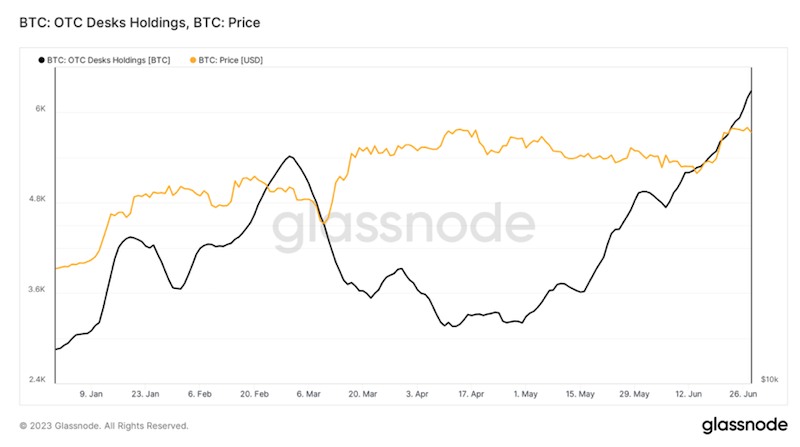Exchange vs OTC: Deciphering the Best Fit for Large Volume Crypto Trades
Based on information provided by Glassnode, Bitcoin’s holdings in Over-The-Counter (OTC) trading – a facet of cryptocurrency trading that frequently goes unnoticed – have reached a peak level in the last year.
Since May 2023, there has been a consistent surpassing of inflows over outflows.
Over-The-Counter (OTC) trading implies the direct transaction of assets such as Bitcoin between two individuals, circumventing conventional exchange platforms.
This form of off-exchange trading is facilitated through a decentralized network of dealers and typically encompasses substantial volumes of Bitcoin.
This method of trade is executed via a decentralized network of dealers. Particularly in the realm of Bitcoin, OTC trades are a preferred means for “whales” or large-scale investors, enabling them to buy or sell substantial amounts of Bitcoin with minimal impact on the market price.

This approach is crucial as executing large trades on open exchanges can lead to notable price variations.
The term “OTC holdings” denotes the quantity of Bitcoin in possession of OTC desks. Insights into the behavioral trends of large-scale investors can be derived from these holdings.
For example, a rise in OTC holdings might imply an increased acquisition of Bitcoin by whales through OTC trades, possibly reflecting a positive market sentiment. On the other hand, a reduction in OTC holdings might suggest the contrary.
What is Exchange Trading?
Exchange trading operates via a centralized platform, allowing multiple buyers and sellers to interact and transact in a secured and regulated environment.
The crypto exchanges offer liquidity, transparency, and competitive pricing, serving as a meeting ground for traders.
Exploring OTC Trading
Exchange platforms serve as the initial point of entry for many investors stepping into the crypto universe. These platforms operate as centralized or decentralized marketplaces, facilitating the buying and selling of cryptocurrencies.
Here, liquidity and market depth are key considerations, with price determined by supply and demand dynamics.
- Liquidity and Market Depth. Essential for accommodating large volume trades without substantial impact on market prices.
- Centralized Exchanges. Operate under a central authority, providing a secure and user-friendly environment.
- Decentralized Exchanges. Operate without a central authority, emphasizing user control and privacy.
On the other hand, crypto OTC operates distinctly, bypassing the public order books of exchanges to facilitate direct trades between buyers and sellers.
This form of trading is predominantly utilized for executing large-volume trades, minimizing the risk of adverse price movements and providing a layer of privacy.
Key Distinguishing Factors
Navigating the complex landscape of cryptocurrency trading often leads traders to a crossroads: choosing between Exchange Trading and Over-The-Counter (OTC) Trading.
These two predominant avenues cater to different needs and offer distinct advantages.
In the ensuing segment, we delve into the key distinguishing factor that set these two methods apart, providing traders with a clear understanding to make informed decisions tailored to their trading objectives.
| — | Exchanges | OTC Trading Platforms |
|---|---|---|
| Volume and Liquidity | Suited for retail investors due to lower volume trades. | Ideal for institutional investors handling immense volumes, ensuring liquidity without substantial price fluctuations. |
| Pricing and Slippage | Prices are susceptible to fluctuations, causing potential slippage. | Offer fixed prices, negating the risks associated with slippage. |
| Privacy and Anonymity | Transactions are public, compromising anonymity. | Upholds the principles of privacy and discretion. |
Factors Influencing Choice between Exchange and OTC Trading
When delving into high-volume trades, various elements come into play, each influencing the decision to opt for an exchange or otc crypto trading platform:
- Transaction Size. OTC trading is the favored route for large transactions, minimizing slippage and offering price stability.
- Privacy Concerns. OTC trading offers a higher degree of privacy, shielding transactions from public view.
- Price Impact. OTC mitigates adverse price impacts on large trades, providing a more stable and predictable trading environment.
- Market Manipulation Risks. The transparency of exchanges can lead to potential market manipulation, a risk mitigated by OTC platforms.
OTC desk crypto platforms act as intermediaries, connecting buyers and sellers discreetly. These desks play a crucial role in the otc crypto market, offering bespoke services.
Bitcoin OTC Trading is crucial in maintaining price stability in high-value Bitcoin transactions, with specialized bitcoin otc brokers and bitcoin otc market players offering tailored services.
Assessing the Robustness of OTC Trading Platforms
A robust crypto otc platform integrates multiple features to cater to the diverse needs of large-volume traders, including:
- Market research and analysis providing insights into market trends, price movements, and potential opportunities.
- Price negotiation allowing for tailored pricing structures to accommodate specific transaction needs.
- Security protocols ensuring the secure execution of transactions, safeguarding against potential risks.
Navigating the Cryptocurrency OTC Market
The otc cryptocurrency exchange landscape is marked by its dynamism and diversity, with platforms catering to a range of cryptocurrencies beyond Bitcoin, including altcoins and tokens.
- Altcoin Trading. The flexibility and discretion of OTC trading platforms extend to a wide array of altcoins, offering tailored solutions for diverse portfolios.
- Token Transactions. OTC platforms facilitate the trading of various tokens, accommodating the unique needs of different traders.
Crypto Trading
To sum it up, the juxtaposition of exchange and otc trading encapsulates the strategic considerations inherent in large-volume crypto trading.
While exchanges offer a transparent and regulated environment, the customized solutions, privacy, and stability of otc crypto exchanges make them a preferred choice for substantial transactions.
The selection between exchange and crypto otc platforms is dictated by individual trading goals, risk tolerance, and transaction volumes.
It’s essential for traders to continually evaluate the evolving crypto landscape, aligning their strategies with market dynamics and leveraging the unique benefits of both trading avenues to optimize outcomes.

